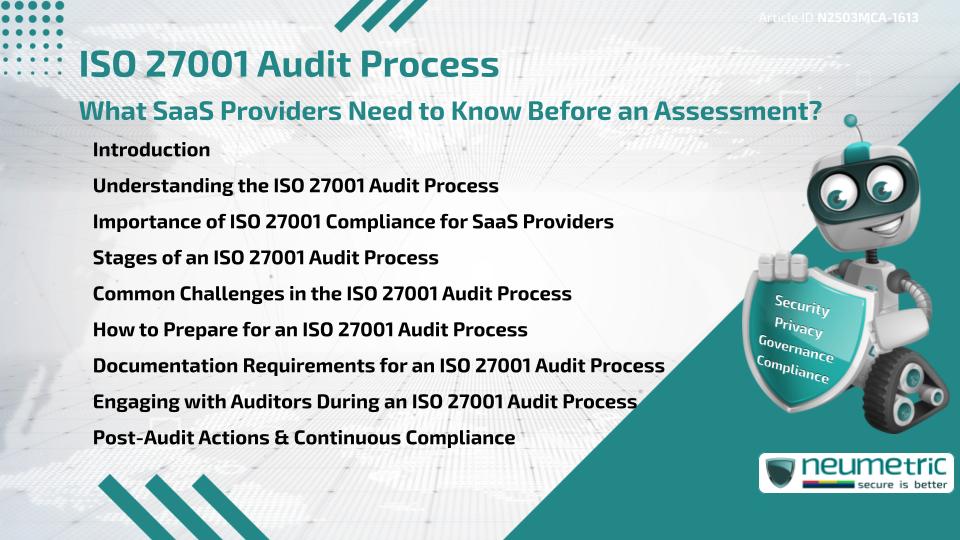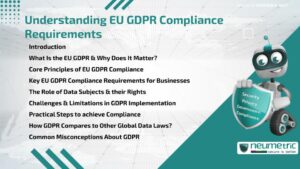Table of Contents
ToggleIntroduction
The ISO 27001 Audit process is a critical step for SaaS Providers aiming to demonstrate Compliance with globally recognized security standards. It ensures that an Organisation’s Information Security Management System [ISMS] meets the requirements set by ISO 27001. With increasing regulatory demands & Customer expectations for Data Security, understanding the Audit process is essential for SaaS businesses. This article explores the key aspects of the ISO 27001 Audit process, from preparation to post-Audit actions.
Understanding the ISO 27001 Audit Process
The ISO 27001 Audit process evaluates an Organisation’s Security Controls, Policies & procedures to determine Compliance with ISO 27001. It involves a systematic review by an accredited auditor to assess the effectiveness of an Organisation’s ISMS. SaaS Providers must be well-prepared to navigate this Audit & meet the necessary Compliance standards.
Importance of ISO 27001 Compliance for SaaS Providers
SaaS Providers handle vast amounts of sensitive Customer Data, making security a top priority. Achieving ISO 27001 Certification through the Audit process builds trust with clients, enhances security posture & ensures adherence to legal & regulatory requirements. Without Compliance, SaaS Providers Risk data breaches, reputational damage & loss of business opportunities.
Stages of an ISO 27001 Audit Process
The Audit process consists of several stages:
- Stage 1: Initial Review – The auditor assesses documentation, Policies & scope of the ISMS.
- Stage 2: On-Site Audit – A deeper evaluation of Security Controls, Risk Management practices & operational effectiveness.
- Stage 3: Certification Decision – Based on findings, the certification body determines whether to grant ISO 27001 Certification.
- Surveillance Audits – Ongoing periodic assessments ensure continued Compliance.
Common Challenges in the ISO 27001 Audit Process
SaaS Providers often face challenges such as:
- Lack of comprehensive documentation
- Insufficient Risk Assessments
- Inconsistent implementation of Security Controls
- Resistance to change within the Organisation
- Misalignment between Security Policies & actual practices
Understanding these challenges allows businesses to address gaps before the Audit begins.
How to Prepare for an ISO 27001 Audit Process
Preparation is key to a successful Audit. SaaS Providers should:
- Conduct an Internal Audit to identify Compliance gaps
- Train Employees on Security Policies & Best Practices
- Maintain clear & up-to-date documentation
- Assign responsibilities for Audit readiness
- Engage external consultants if necessary
Documentation Requirements for an ISO 27001 Audit Process
Documentation plays a crucial role in the Audit process. Required documents include:
- ISMS scope & Security Policies
- Risk Assessment reports
- Statement of Applicability
- Business Continuity & incident management plans
- Employee security awareness training records
Having well-organized documentation ensures a smoother Audit process.
Engaging with Auditors During an ISO 27001 Audit Process
Successful engagement with auditors requires:
- Transparent communication
- Providing requested evidence promptly
- Demonstrating a commitment to Continuous Improvement
- Addressing concerns raised during the Audit
Auditors assess not only Compliance but also the Organisation’s commitment to security Best Practices.
Post-Audit Actions & Continuous Compliance
After the Audit, SaaS Providers should:
- Review Audit Findings & address Non-Conformities
- Implement Corrective Actions
- Maintain Continuous Monitoring of Security Controls
- Prepare for future surveillance audits
ISO 27001 Compliance is an ongoing process that requires continuous effort & improvement.
Conclusion
The ISO 27001 Audit process is a crucial element in ensuring robust security practices for SaaS Providers. By understanding the Audit stages, preparing adequately & maintaining continuous Compliance, Organisations can successfully achieve certification & enhance their security posture. While challenges exist, proactive measures & a strong commitment to Information Security will help SaaS businesses navigate the Audit with confidence & gain a competitive advantage.
Takeaways
- The ISO 27001 Audit process is essential for SaaS Providers to ensure Compliance & build trust with clients.
- The Audit involves multiple stages, including initial review, on-site assessment & certification decision.
- Common challenges include documentation gaps, inconsistent security practices & resistance to change.
- Proper preparation, clear documentation & active engagement with auditors enhance the Audit outcome.
- Post-Audit actions focus on continuous Compliance & addressing Audit Findings.
FAQ
What is the ISO 27001 Audit process?
The ISO 27001 Audit process is a structured assessment of an Organisation’s ISMS to verify Compliance with ISO 27001 security standards.
How long does an ISO 27001 Audit process take?
The duration varies based on Organisation size & complexity, typically taking a few weeks to several months from preparation to certification.
What documents are required for an ISO 27001 Audit process?
Key documents include the ISMS scope, Risk Assessments, Security Policies & Business Continuity plans.
What are the common challenges in the ISO 27001 Audit process?
Challenges include inadequate documentation, lack of Employee Training & inconsistent security implementations.
How can SaaS Providers prepare for an ISO 27001 Audit process?
Preparation involves internal audits, Employee Training, proper documentation & engaging with auditors transparently.
What happens if a SaaS provider fails the ISO 27001 Audit process?
Failure may require Corrective Actions & a follow-up Audit to address identified Non-Conformities before certification is granted.
Is ISO 27001 Certification mandatory for SaaS Providers?
While not legally mandatory, ISO 27001 Certification is highly recommended to meet industry security standards & Customer expectations.
How often should a SaaS provider undergo an ISO 27001 Audit process?
Initial certification is followed by annual surveillance audits & a full re-certification Audit every three (3) years.
What role do auditors play in the ISO 27001 Audit process?
Auditors evaluate Compliance, assess Security Controls & provide recommendations for improvement based on ISO 27001 requirements.
Need help?
Neumetric provides organisations the necessary help to achieve their Cybersecurity, Compliance, Governance, Privacy, Certifications & Pentesting goals.
Organisations & Businesses, specifically those which provide SaaS & AI Solutions, usually need a Cybersecurity Partner for meeting & maintaining the ongoing Security & Privacy needs & requirements of their Clients & Customers.
SOC 2, ISO 27001, ISO 42001, NIST, HIPAA, HECVAT, EU GDPR are some of the Frameworks that are served by Fusion – a centralised, automated, AI-enabled SaaS Solution created & managed by Neumetric.
Reach out to us!





